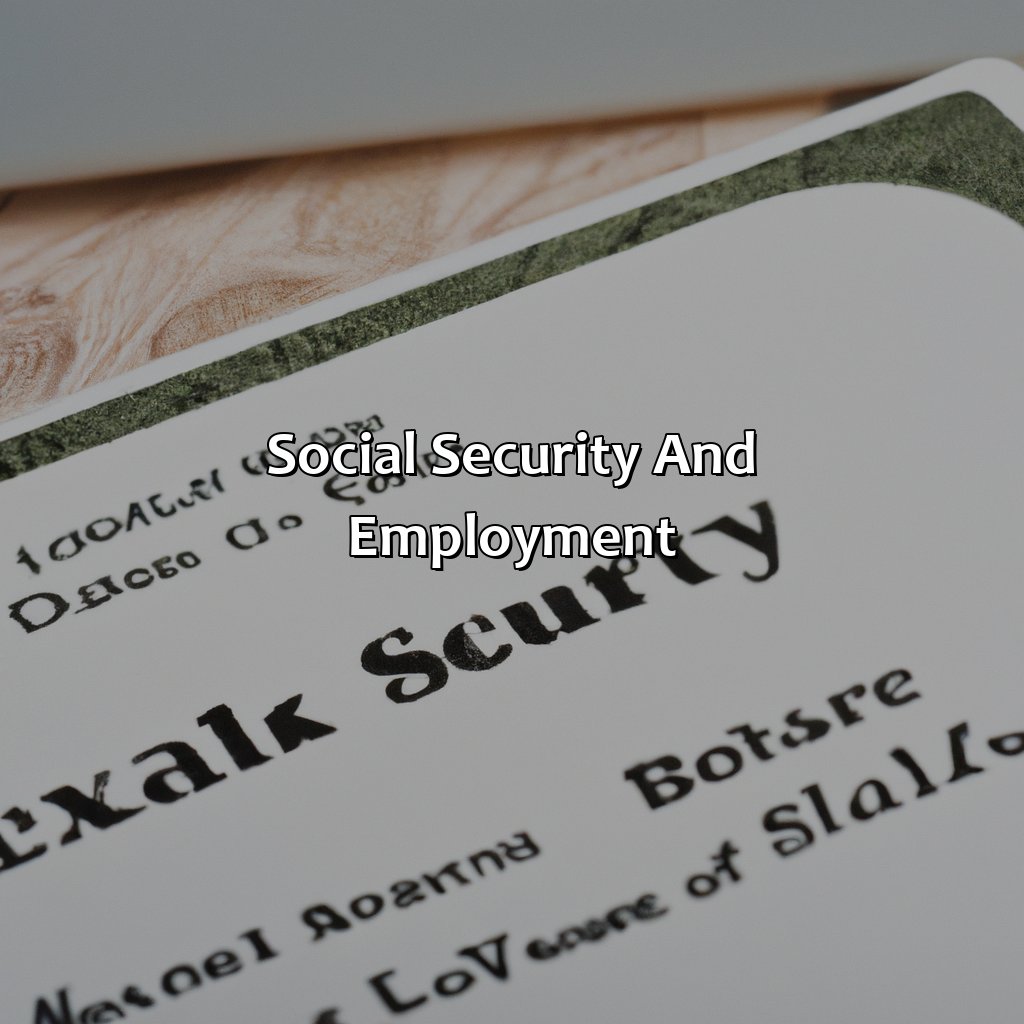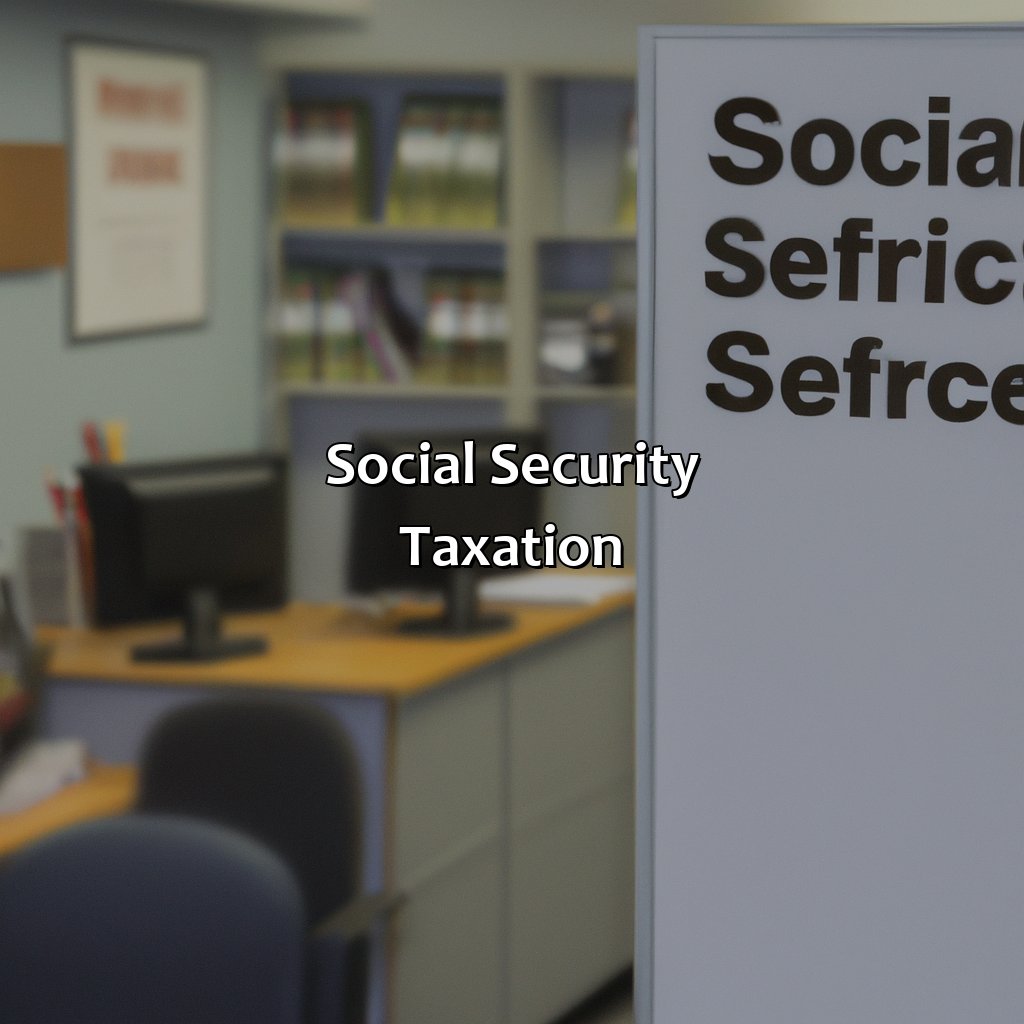When Start Social Security?
Key Takeaway:
- You can start receiving Social Security benefits as early as age 62, but your benefits will be reduced if you start before your full retirement age. Your full retirement age depends on the year you were born and ranges from 66 to 67 years old.
- There are earnings limits in place if you choose to start receiving benefits before your full retirement age and continue working. Once you reach your full retirement age, there are no earnings limits.
- To apply for Social Security benefits, you can do so online, over the phone, or in person at your local Social Security office. It is recommended to apply three months before you want your benefits to begin.
Are you uncertain when to actually begin claiming Social Security retirement benefits? Don’t worry, you’re not alone! We’ll help you navigate the ins and outs of when to start Social Security, so you can get the most out of it.
Eligibility for Social Security Benefits
Are you eligible for Social Security benefits? To find out, you must meet certain requirements. Check out the ‘Eligibility for Social Security Benefits’ section to discover the age and earnings limits. You need to understand these sub-sections to know if you qualify for Social Security.

Image credits: retiregenz.com by David Washington
Age Requirements
Requisite Age for Social Security Entitlements
Social Security Benefits can be availed of when one meets specific age thresholds. Under US law, a person must meet certain eligibility requirements to qualify for these benefits. The age requirement is determined based on the individual’s date of birth.
Individuals reaching 62 years old are eligible to start receiving a reduced benefit amount, and those reaching their full retirement age between 65-67 years old (depending on their birth year) are eligible for full social security benefits. However, there is no need to claim benefits at your full retirement age.
Furthermore, individuals who delay claiming social security beyond their full retirement age can increase their benefit up to the maximum amount at age 70. Therefore, it is recommended that each individual seeks out professional financial advice to explore all possible options.
Since its inception during the Great Depression era, the Social Security program has provided financial assistance to retirees, disabled persons and families left without the support of primary wage earners.
Looks like the only earnings limit for social security benefits is how much you can stomach working past retirement age.
Earnings Limits
Limitations in the income earned by individuals who receive social security benefits can affect their eligibility for payments. The restrictions can be described as ‘earnings limits.’ If exceeding these monthly or yearly earnings, the individual may not receive any social security benefits or reduced payments.
The senior receiving social security benefits must accurately calculate their potential earnings to prevent disqualification from receiving payments. Since exceeding the cap can cause interruption in payments, always factor in extra money towards taxes that need to be paid on top of expenses like healthcare.
It is critical to review your earnings limit annually as it varies according to age and date of birth. Be sure to obtain accurate information from Social Security Administration (SSA), upon which you can base your financial decisions.
Ensure you don’t miss out on what you’re entitled to by obtaining an estimate on your upcoming social security payments. It’s important to keep track of your earnings amount and stay within SSA’s guidelines so that unexpected changes will not impact your entitlements.
If only applying for Social Security benefits was as easy as applying a filter on Instagram.
How to Apply for Social Security Benefits
Applying for Social Security Benefits is simpler when using the correct methods. Choices include online, phone, or in-person applications. In this article, we’ll take a look at the advantages of each. All of these options make applying easier for millions of Americans.

Image credits: retiregenz.com by Adam Duncun
Online Application
Submitting Your Social Security Benefits Application Electronically
Submitting your Social Security application electronically can save you time and reduce errors. The process is user-friendly and efficient, allowing you to complete the entire submission from your home computer.
You simply need to create an account on the Social Security Administration website to start the process. The form will prompt you to provide all necessary documentation. After submitting your application electronically, make sure to check your email for any further information requested by Social Security.
If electronic submission isn’t an option for you or if you’d like additional help with the process, an appointment at the local Social Security office may be a better option.
Don’t miss out on your potential benefits by delaying this important step in the process. Apply today and take control of your financial future.
Skip the awkward small talk and just dial 1-800-772-1213 to apply for social security benefits, because let’s be real, who enjoys talking to strangers face to face?
Phone or In-Person Application
Applying for Social Security benefits can be done either through a Face-to-Face Interview or a Telephone Interview. Both methods are equally efficient and allow the applicants to submit their applications successfully. During the interview, applicants must provide personal information and supporting documents to complete the application process.
Depending on an applicant’s preference, they can schedule either a Face-to-Face or Telephone interview appointment with the Social Security Administration. Those who are comfortable with face-to-face interactions can choose to visit their local Social Security Office. Alternatively, those who prefer applying over the phone without leaving their home can choose the latter method.
It is important to note that both methods require specific documentation needed for eligibility determination, such as birth certificates, tax returns, bank statements and more. In addition, applicants should have details of their work history when applying for benefits.
Applicants should ensure they have completed all necessary steps before applying for benefits to avoid any delays in receiving payments and minimize errors during the interview. For instance, they should prepare all original documents and copies of similar nature according to guidelines before scheduling an appointment via phone.
In one instance, a woman applied in person but forgot to bring her birth certificate, causing her application process to take longer than expected. Having these documents in hand beforehand would have made the process smoother and quicker ultimately, leading towards successful social security benefits acquisition.
“Calculating your Social Security benefits is like trying to solve a Rubik’s cube blindfolded – you might get it right, but it’s going to be a painful and confusing process.”
Benefits Calculation
To work out your social security benefits, it’s important to understand the system with Primary Insurance Amount (PIA) and Cost-of-Living Adjustments (COLA). PIA shows how much you’ll get each month. COLA adjusts the benefits for inflation. Let’s take a closer look. That’ll help you work out your social security benefits and understand them better.

Image credits: retiregenz.com by Joel Washington
Primary Insurance Amount (PIA)
Your Social Security benefit is determined by your Primary Insurance Amount (PIA), which is calculated using your highest 35 years of earnings. This amount is adjusted for inflation and serves as the baseline for your retirement benefits. Your age at the time you start receiving Social Security benefits also impacts the amount of your benefit. If you start receiving benefits before full retirement age, your PIA will be reduced, while delaying until after full retirement age will increase it.
It’s important to note that there are strategies available to maximize your eventual Social Security benefit based on a variety of factors such as life expectancy, income needs, and health status. For example, waiting until age 70 to begin taking Social Security benefits can result in a higher PIA and overall lifetime benefit if you have a longer life expectancy. Additionally, continuing to work and earn income in early retirement years can also boost your eventual PIA.
Each individual’s situation is unique and consulting with a financial advisor or knowledgeable expert can help determine the best strategy for maximizing your Social Security benefit. By understanding the intricacies of the calculation process and considering different options for timing and earning potential, you can potentially increase your overall lifetime benefit from Social Security.
Who needs a cost-of-living adjustment when you’ve got ramen noodles and a can-do attitude?
Cost-of-Living Adjustments (COLA)
Social Security Administration provides Cost-of-Living Adjustments (COLA) to raise the benefit payments for Social Security recipients. The adjustment occurs annually to account for changes in inflation, ensuring retired citizens receive appropriate benefits relative to their increasing expenses.
The COLA formula involves the Consumer Price Index for Urban Wage Earners and Clerical Workers (CPI-W), which measures cost increases in food, clothing, housing, transportation, medical care, recreation, and education. It calculates inflation from 3rd quarter of two years ago to 3rd quarter of previous year to determine the adjustments necessary. This mechanism applies equally across all corners-whether retired workers or family members-like widows from SS program entitled funds.
With COLA adjustments happening every year since 1975 under title II of social security act with discretionary power entrusted in hands of president since 2014; hence we must consistently keep an eye on news about such developments alongside retirement portfolio reviews. These yearly increments are helpful not only because they help alleviate financial pressure but also ensure that beneficiaries don’t outlive their retirement savings inflows.
To optimize your Social Security benefits one can consider delaying claiming till age 70 to increase their COLA adjustments alongside intensifying a supplemental income source like Individual Retirement Accounts (IRA) or an employer sponsored retirement plan. Also reduced expenses through downsizing can help senior with overall cashflow challenge: a smart move if planned well in advance! Whether you file early or late, just remember that it’s never too early or too late to regret your life choices.
Impact of Early or Late Filing
We’ll break down the effects of filing for social security early or late. Early filers get less benefits, while late filers get more. We’ll go into detail so you can make a wise decision. You’ll know when’s best to start your social security.

Image credits: retiregenz.com by Harry Arnold
Benefits Reduction for Early Filers
Choosing to file for social security benefits early may result in a reduction in the amount of monthly benefits received. The reduction will continue for the entire time that benefits are received and can significantly impact retirement income.
It is important to consider the long-term implications of starting social security early, particularly if there are no other sources of retirement income available. Delaying filing can result in a larger monthly benefit and increased financial stability throughout retirement.
To offset the potential loss of income from delaying benefits, it may be worth considering working longer or finding other sources of income during retirement. Another option is to maximize individual retirement account contributions or explore part-time work opportunities.
Delaying social security filing is not always possible, and each individual’s circumstances are unique. However, understanding the implications and making an informed decision can help ensure long-term financial stability during retirement years.
Late to the party? No worries, your social security benefits will still show up fashionably late.
Benefits Increase for Late Filers
Late Filers for Social Security can receive increased benefits. Here are some key points to consider when deciding whether to start claiming early or delaying:
- Benefits increase by 8% for each year deferred after full retirement age (FRA)
- Maximum increase occurs at age 70, giving up to a 32% increase in monthly payments
- Delayed benefits can result in larger lifetime payouts, especially for those with longevity in their family
- Early filings can result in a permanent reduction of benefits by up to 25% before FRA
- Consider other factors such as health status and retirement plans when making the decision
It’s important to note that other factors come into play when deciding on the optimal starting point for one’s social security. It’s advised to seek professional help before making any decisions regarding social security benefits.
Did you know that prior to the Social Security Amendments of 1983, workers were able to receive full social security benefits at age 65, regardless of when they retired? This was changed due to concerns about the program’s solvency and increasing lifespan of the population.
Who needs a job when you have Social Security? Just file early and enjoy retirement while your former coworkers are stuck in rush hour traffic.
Social Security and Employment
Navigate the Social Security and Employment complications with Retirement Earnings Test and Working While Receiving Social Security Benefits. These sub-sections will assist you in comprehending how your job income influences your Social Security benefits. Also, how you can keep working and still get benefits at the same time.

Image credits: retiregenz.com by Yuval Woodhock
Retirement Earnings Test
Retirement Income Limit Test evaluates the cash benefits you can obtain while working without reducing your benefits. For every $2 earned above the limit ($18,960 in 2021), $1 is withheld from your Social Security benefit. If you turn FRA during the year, then a higher limit applies- up to $50,520 in 2021.
Additionally, self-employed individuals’ net earnings count; however, special income rules apply to farmers and clergy members. Zero-income months do not reduce or delay your benefit, and pre-FRA earnings do not count toward early retirement reductions after you reach full retirement age.
Take John as an example. John filed for his Social Security benefits at age 62 and continued to work part-time earning $25,000 a year. Since he was below his FRA ($16,728), his Social Security benefits reduced by one dollar for every two dollars over $16,728 – a reduction of $4,136 since he earned $8,272 over the limit. However, since John’s birthday was on July 15th (within six months of the year he turned FRA), only the penalties occurred before July 15th ($3 for every $1 earned) and not after.
Overall, knowing when to start receiving your Social Security benefits will affect your monthly compensation even though employment choices are fruitful.
Looks like it’s not all work and no play when it comes to Social Security benefits – you can have your cake and eat it too, as long as you work and don’t choke on the crumbs.
Working While Receiving Social Security Benefits
Receiving Social Security Benefits while being employed is a prospect that many individuals consider. However, receiving full benefits may not always be possible if one works. Instead, a person may receive reduced or partial benefits depending on their income.
The SSA has specific rules and guidelines for working while receiving Social Security Benefits. A recipient must report all earnings, whether self-employed or not and follow certain limitations, such as earning a maximum limit each month. Additionally, the earnings test only applies up to the full retirement age (FRA). Once you reach FRA, your benefits won’t be withheld based on your earnings.
It’s important to note that if someone continues working after they start receiving social security benefits before reaching full retirement age, there’s a chance of lower benefit payout amounts in the future. The payout will increase when reaching FRA again because it is recalculated during that time.
Don’t miss out on the full benefits entitled to you by following the SSA rules carefully to avoid loss of benefit amounts in the long run.
Why pay for your own retirement when you can also fund your neighbor’s 14th vacation to Hawaii through Social Security taxation?
Social Security Taxation
Delve into “Social Security Taxation” to understand the complexities. There are two sub-sections:
- “Taxation of Social Security Benefits”, which will give you an insight into taxation for Social Security benefits.
- “Taxation of Social Security Wages”, which will give you an insight into taxation for Social Security wages respectively.

Image credits: retiregenz.com by Adam Arnold
Taxation of Social Security Benefits
Social Security benefits can be subject to taxation under certain circumstances, and it is essential to understand the rules before starting these payments. For instance, if your combined income exceeds a certain threshold, this could trigger taxation of up to 85% of your Social Security benefits. It is worth noting that not all states impose taxes on these payments, so you should research your specific location’s regulations. Furthermore, planning ahead and managing your finances can help reduce the impact of tax liabilities on your retirement income.
It is also important to know that the amount you receive in Social Security benefits may vary depending on when you start taking them. While you are eligible to start claiming benefits as early as age 62, if you delay receiving payments until full retirement age (currently ranging from 66 to 67), then your benefit amounts could increase significantly. On the other hand, waiting beyond full retirement age could result in even higher payouts but isn’t always recommended for everyone. Therefore, it’s crucial to understand how timing affects your Social Security income.
Understanding how taxes apply to Social Security can be challenging, especially since IRS rules change frequently; thus consulting a professional advisor would be beneficial. One must also consider other factors such as asset allocation and health status while planning their social security earnings.
At his retirement party, John realized that he had failed to properly account for taxation on his Social Security payments throughout his career. As a result, he faced an unexpected bill from the IRS during what was supposed to be his golden years’ enjoyment. Without careful planning beforehand, John learned an unfortunate lesson about the complex relationship between retirement income and taxes.
Looks like the only thing certain in life are death, taxes, and the taxation of social security wages.
Taxation of Social Security Wages
Social Security benefits are taxable, and the taxation of these wages depends on the recipient’s annual income. If someone earns a certain amount, part of their Social Security benefit may be subject to tax. This threshold varies depending on the individual’s filing status and total income, including half of their Social Security benefit.
To calculate how much of a person’s Social Security wages will be taxed, they need to add up all their income sources and then compare that total to the applicable threshold level. If they go over that threshold amount, up to 85% of their Social Security benefit could be subject to tax.
It is essential to keep track of this taxing situation as individuals may need to set aside money throughout the year if they know they will owe taxes on their Social Security benefits when tax day rolls around.
However, people who retire without any additional taxable earnings can start collecting social security earlier and still avoid paying taxes on it altogether. These unique details should be taken into account while claiming your social security in retirement planning.
For example, Mrs.X decided to consult a financial adviser about her retirement plan years before she reached her full retirement age. After discussing her earning history and future goals, she realized that if she retired early enough without earning additional taxable earnings during her retirement period, she would not have to pay taxes on her Social Security benefits for years.
Who needs a healthy body when you can just collect social security disability benefits?
Social Security Disability Benefits
To grasp Social Security Disability Benefits, and how to apply, you must grasp the requirements and application process. This section on “Social Security Disability Benefits” and its sub-sections “Eligibility Requirements” and “Application Process” will provide you the solutions and information needed to begin.

Image credits: retiregenz.com by Adam Jones
Eligibility Requirements
To be eligible for Social Security Disability Benefits, one must meet specific medical and non-medical requirements. The medical requirement is based on having a severe long-term disability that prevents substantial work for at least 12 months or is expected to result in death. Non-medical requirements include work credits and age criteria.
Work credits are earned through employment and determine if an individual has paid into the Social Security system enough to qualify for benefits. The number of required credits varies based on age. Age also plays a factor in determining eligibility as younger individuals may have different requirements compared to those at or near retirement age.
Additionally, income limitations may impact eligibility for SSDI benefits. If an individual earns above a certain amount from working, their eligibility may be impacted.
John had been employed as a long-distance truck driver when he suffered a severe back injury that left him unable to continue working in his field. He applied for SSDI benefits but was initially denied due to not meeting the required work credit threshold. However, after appealing the decision and providing additional medical evidence, John’s application was approved, highlighting the importance of understanding eligibility requirements and seeking assistance when facing denials.
Good news for procrastinators: Applying for Social Security Disability Benefits is the one place where being late won’t cost you.
Application Process
To apply for social security disability benefits, one must complete the Application Procedure. It includes filing an application, submitting supporting documents and medical records to prove the disability and waiting for approval from the SSA officials.
The initial step of the Application Process is to complete an online form or visit a local SS office to file an application. The applicant must include all relevant personal information, work history, and details of the onset of disability. It is crucial to provide accurate information regarding expenses, income and medical treatments received.
After filing the claim, medical records and supporting documents should be submitted as proof of disability. An applicant can take advantage of technical medical-vocational allowances that determine if their condition meets specific criteria laid down by the SSA guidelines.
It may take several months or years for an applicant to receive approval/disapproval notification from Social Security authorities due to the backlog of claims in processing.
As Social Security is critical financial assistance for disabled Americans, we recommend getting support from legal aid or seeking counsel to prepare a strong application with proper documentation. Taking these measures significantly increases your chances of receiving benefits sooner rather than later.
Why worry about dying when you can just focus on getting those sweet Social Security Survivor Benefits?
Social Security Survivor Benefits
Understand Social Security Survivor Benefits? That’s no problem! Let’s focus on eligibility requirements and application processes. This’ll help you know how to make sure you and your loved ones get the benefits you deserve. We’ll look at what must be met for survivor benefits and the steps to take to apply. Get ready to learn!

Image credits: retiregenz.com by Yuval Jones
Eligibility Requirements
To be eligible for Social Security Survivor Benefits, the deceased worker must have enough credits. This benefit is applicable to widows or widowers who are at least 60 years old or those with a qualifying disability. Survivors who are caring for the deceased’s child (under 16 years old) can also receive benefits. Additionally, dependant parents of the survivor could also get this benefit.
Pro Tip: It’s essential to consider factors such as life expectancy and financial needs before deciding when to start claiming Social Security Survivor Benefits.
Applying for survivor benefits is like a job interview, except you don’t get to negotiate your salary and the only question they ask is ‘Are you still dead?’
Application Process
If you are looking to apply for Survivor benefits, you will need to go through the application process. To begin with, make sure you have all the necessary documents and information required by the Social Security administration. The process can be started online or by visiting your local Social Security office.
During the application process, you will need to provide personal identifying information such as date of birth, social security number, and a copy of the death certificate of the deceased spouse or parent. Additionally, you will need to provide details about your relationships – marital status, children if any, etc. – that are pertinent for determining eligibility for survivor benefits.
It is important to keep in mind that not all family members are eligible for survivor benefits, so it’s crucial that you understand who meets the criteria before starting the application process. Eligible spouses have different rules and requirements than those set up for eligible children or parents.
Before initiating a survivor benefit claim make sure it is necessary or worthwhile? For example if your own retirement benefit would provide you with more income then claiming on an earlier point could create issues.
It’s prudent to gather as much information as possible about social security survivor benefits before making an application. Consider tax implications and potential consequences of delayed filing when making decisions as they may adversely affect your financial situation going forward in life.
Five Facts About When to Start Social Security:
You can start receiving Social Security benefits as early as age 62 (Source: Social Security Administration)
If you start receiving benefits before your full retirement age, your benefits will be reduced (Source: Social Security Administration)
Your full retirement age depends on the year you were born (Source: AARP)
Delaying your benefits past your full retirement age will result in a higher monthly benefit (Source: Forbes)
You can continue working and receiving benefits, but your benefits may be reduced depending on your income (Source: Social Security Administration)
FAQs about When Start Social Security?
When can I start collecting Social Security?
You can start collecting Social Security retirement benefits as early as age 62, but your monthly benefit amount will be reduced if you start collecting before your full retirement age (FRA). Your FRA depends on the year in which you were born.
What is my full retirement age?
Your full retirement age (FRA) depends on the year you were born. If you were born in 1960 or later, your FRA is 67. If you were born between 1943 and 1954, your FRA is 66. For those born between 1955 and 1959, the FRA gradually increases from 66 to 67.
Should I start collecting Social Security as soon as I turn 62?
It depends on your individual circumstances. While you can start collecting Social Security at age 62, your monthly benefit amount will be reduced. If you continue to work, your benefit amount may also be reduced. You may want to consider waiting until your FRA or even later to start collecting benefits if you are able to do so.
Can I collect Social Security if I’m still working?
Yes, you can collect Social Security while still working, but your benefit amount may be reduced if you earn above a certain amount. Once you reach your FRA, there is no limit on how much you can earn while collecting Social Security.
What happens to my Social Security benefits if I die?
If you die before you start collecting Social Security, your spouse may be eligible for survivor’s benefits. If you die after you start collecting benefits, your surviving spouse may be eligible for a higher benefit amount based on your earnings record.
How do I apply for Social Security retirement benefits?
You can apply for Social Security retirement benefits online, over the phone, or in person at your local Social Security office. You will need to provide information about your earnings and work history, as well as your date of birth and Social Security number.
 Checkout this IRS Loophole
Checkout this IRS Loophole 
